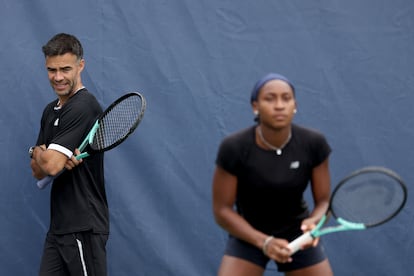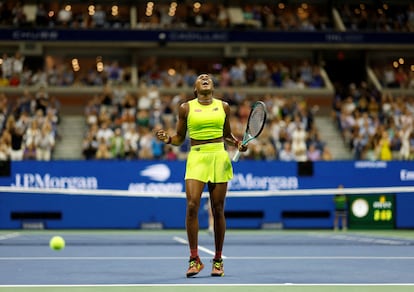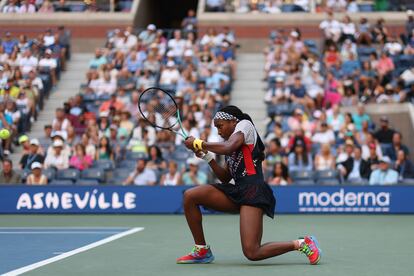‘Coco Gauff is finding her identity’
The American player’s coach, Pere Riba, analyzes the evolution of the rising tennis star that will play this Saturday for her first Grand Slam title


Sitting in one of the lounges of the hotel where he is staying, very close to Central Park, Pere Riba talks about what it means to coach a tennis player with so much star potential and media attention as Coco Gauff. At 19, the American is much more than just a player who continues to climb to the top and who this Saturday is going to play her first US Open final. She is a brand — an ambassador. With Serena Williams having retired a year ago, the United States considers Gauff to be the next link in the great chain of success of American tennis and counts on the Florida native to make her definitive breakthrough.
Riba ranked as high as world No. 65 and stopped playing at the age of 30. The 36-year-old Barcelona native remained linked to tennis, and after coaching Roberto Carballés and Pedro Martínez, he teamed up with Varvara Lepchenko, Qinwen Zheng and now Gauff. The father of the latter followed the coach closely and after a telephone conversation, he and Gauff got to work. It seems no coincidence that her arrival on the bench in June coincided with a long overdue upturn. Before landing at the U.S. Open, Gauff won the two most important tournaments of her trajectory, Washington and Cincinnati. Now, she will play her second major final after losing last year at Roland Garros.
Riba is aware that he has in his hands a diamond — the same one that Roger Federer captured through his representation agency (Team8) and that, at only 15 years old, dazzled Wimbledon. “We have introduced a couple of fundamental changes” in her technique, the coach says. “I always say that in a process of change, the essential thing is not the result, but the form. If you play good tennis and understand what you have to do, it is much easier for the results to follow. I look for evolution, and she is achieving it. Not all players can play the same way, and Coco is finding her identity. She has taken several steps forward, but I think she can still improve a lot more. Her room for evolution is so, so big,” he adds.

This year, all eyes are on Gauff. In a way, they always have been. She’s long been associated with Serena for the precocity of her irruption and her transcendence beyond the courts. Socially committed, articulate and attractive to brands, in addition to connecting perfectly with new audiences, Gauff carries the pressure of being Serena’s theoretical successor on her shoulders. “She’s had to deal with that since she was a little girl,” Riba says, “but she handles it very well. She’s a very mature girl for her age, and she has her feet on the ground. Before she was a little uneasy, but now she’s more confident, and she feels strong, and when you feel strong mentally, you make progress unconsciously.”
Star potential
Riba describes her as a professional who is “super-competitive, very hard-working and a very good person”, and adds that she is also “talkative and knows how to listen”. Gauff — the seventh tennis player (between men and women) who earned the most money in the last year, $15.2 million — no longer reduces everything to what happens on the court, but rather “enjoys the process and the daily work,” according to her coach. In that sense, Riba compares Gauff’s journey to that of Carlos Alcaraz. “After every tournament, Carlos is a better player, and the same thing is happening with her,” he says. Both players ooze charisma and freshness, “so [fans] stop us every now and then when we go down the street. But she handles it all with a lot of humility. When they tell you that you are very pretty and the best, that is not easy at all. But she is very clear about it.”

The coach highlights Gauff’s physical capacity — “the best right now at an athletic level” — and assures that she and Polish Iga Swiatek are the best movers on the circuit. “We put a lot of emphasis on footwork. Coco is very fast, but it’s just as important to play with the ball, which is when you hit, as it is without the ball. She used to play very well at impact, but then she lost positionally; now she’s moving much better and seems to reach more balls, but it’s simply a matter of positioning. She reads space better,” says Riba, who is confident that Gauff can make the big leap next season and say: “Here I am.”
It’s all led to this Saturday’s grand final in New York. “Everyone says that she has to win this tournament, but I don’t see it that way. She is 19 years old, she is growing and learning. She’s taking small steps, she’s responsive; you demand and she responds. It’ll be different when she’s 24, then we can demand that she wins. But if she continues with this hunger and being so willing to improve, she will be a candidate to win Grand Slams and be number one. When the raw material is so, so good, the result can be seen very quickly. People compare her to Serena, but she wants to make her own way. Her room for improvement is huge… But yes, the plan is going well. Very well,” says Riba.
GILBERT, A GURU IN THE SHADOWS
In addition to hiring Riba, the American player decided to call on the extensive experience of Brad Gilbert, a prestigious coach who guided the steps of figures such as Andre Agassi, Andy Roddick and Andy Murray. He also advised Japan's Kei Nishikori.
As a player, Gilbert (Malibu, California; 62 years old) became number four in the world in 1990 and won 20 individual titles, in addition to winning Olympic bronze at the Seoul Games in 1988. However, in the majors, his highest point was the quarterfinals he reached at the 1987 U.S. Open.
He is also currently a commentator for ESPN, and in June he joined Gauff's team. Riba supervises the day-to-day, while Gilbert was hired as a consultant. "He is a consultant, someone external who gives advice. He joined us from Washington. There is good energy with him, and if Coco is happy with his input, so am I," says Riba.
Sign up for our weekly newsletter to get more English-language news coverage from EL PAÍS USA Edition
Tu suscripción se está usando en otro dispositivo
¿Quieres añadir otro usuario a tu suscripción?
Si continúas leyendo en este dispositivo, no se podrá leer en el otro.
FlechaTu suscripción se está usando en otro dispositivo y solo puedes acceder a EL PAÍS desde un dispositivo a la vez.
Si quieres compartir tu cuenta, cambia tu suscripción a la modalidad Premium, así podrás añadir otro usuario. Cada uno accederá con su propia cuenta de email, lo que os permitirá personalizar vuestra experiencia en EL PAÍS.
¿Tienes una suscripción de empresa? Accede aquí para contratar más cuentas.
En el caso de no saber quién está usando tu cuenta, te recomendamos cambiar tu contraseña aquí.
Si decides continuar compartiendo tu cuenta, este mensaje se mostrará en tu dispositivo y en el de la otra persona que está usando tu cuenta de forma indefinida, afectando a tu experiencia de lectura. Puedes consultar aquí los términos y condiciones de la suscripción digital.








































